
The Realme GT Neo 3 is the fastest charging smartphone in the world, sporting the 150-watt Ultradart Charge. But is this feat from Realme enough to make it a good smartphone? I share my opinion in this complete Realme GT Neo 3 review.

NEXTPITTV
Good
- Nice 120-Hz AMOLED display
- Bright and well calibrated screen
- Awesome design
- Solid battery life
- Honest update policy
- Efficient main camera lens
- REALLY FAST CHARGING
- Stable performance and no overheating issues
Bad
- Not the most powerful SoC in this price range
- The 2 MP macro lens is unnecessary
- No microSD port, 3.5mm jack or IP rating
- The 150W version is expensive
The Realme GT Neo 3 in a nutshell
The Realme GT Neo 3 is a smartphone that I would describe as a mid-range device. It comes in two versions, one with 150W fast charging in 12/256 GB at €699.99 while the model with 80W charging and 8/256 GB configuration will cost €599.99. Since Realme is not directly selling their phones in the US, you’ll have to shop on AliExpress and the likes. I was loaned the 150W model for review.
Some elements of its specifications are worthy of a flagship, such as its 120 Hz AMOLED screen, the main Sony IMX 766 50 MP camera sensor and its Ultradart Charge that speeds things along nicely at 150 watts. However, other specifications betray its mid-range nature like its 2 MP macro sensor, the plastic frame, and especially its MediaTek Dimensity 8100 SoC.
Faced with the Realme GT 2, which is a very similar smartphone, but equipped with the Snapdragon 888, the Realme GT Neo 3 bets on fast charging to make the difference. And if the ability to charge from 0 to 100% battery in 15 minutes is undeniably a killer feature, it is far from being the only asset of this smartphone brandishes in a very balanced configuration.
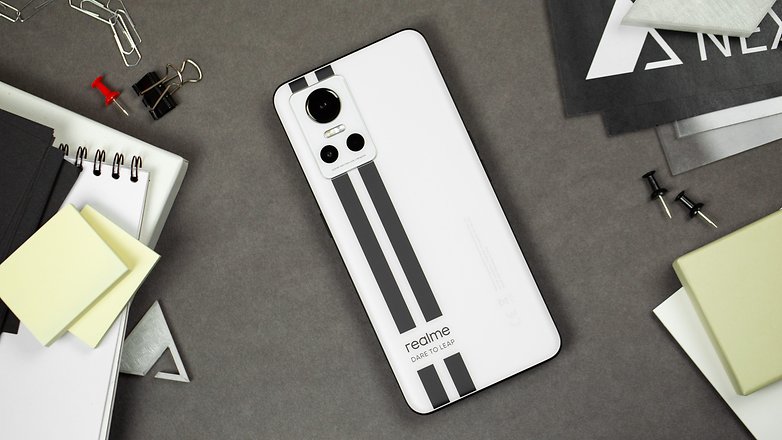
Design: A very racy look
The Realme GT Neo 3 sports a design that was clearly inspired by the world of motor racing. Its look logically oozes with speed and will not please everyone, but the manufacturer definitely offers a very neat finish.
What I liked:
- Very cool racing stripes and neat finish
- Coating at the back is soft to the touch
- Camera module is almost flush with the body
- Relatively lightweight at 188 grams
What I disliked:
- No IP rating, microSD port or 3.5mm jack
- Not very compact dimensions (163.3 x 75.6 x 8.2 mm)
- Plastic frame
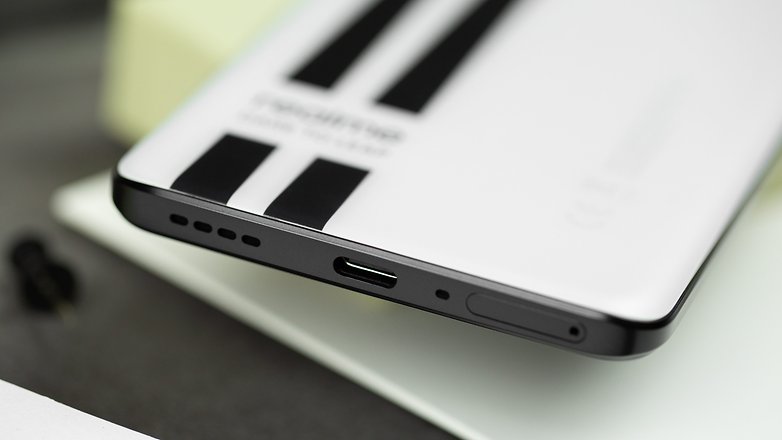
The Realme GT Neo 3 comes in three colors: Asphalt Black, Sprint White and Nitro Blue. I was able to review the Sprint White version and I really liked this design. The glass back is matte and soft to the touch. It is marked with two racing stripes interspersed with the brand name as well as its motto, “Dare to Leap.”
To put it nicely, you might think the look of the Realme GT Neo 3 is a bit Jacky Tuning. But for the time being, I find it more classy than garish. The finish is top notch and it feels like a premium product in your hands. The coating has the merit of being immune to picking up fingerprints.
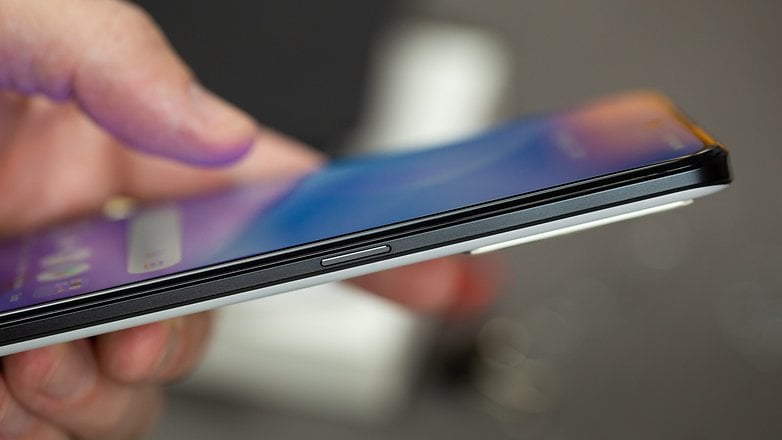
The front and back are protected by Corning Gorilla Glass 5. The screen is flat and doesn’t have an overly wide chin or front. The volume buttons on the left and the power button are well placed and are quite firm, which makes the “feedback” pleasant when pressed.
The smartphone is also quite light, tipping the scales at 188 grams despite its rather large dimensions of 163.3 x 75.6 x 8.2 mm. On the other hand, Realme omits the IP rating for waterproofing, a microSD port for memory expansion, and the 3.5mm jack. The plastic frame is also not optimal in terms of durability.
Screen: A 120 Hz AMOLED panel worthy of a flagship
The Realme GT Neo 3 features a 6.7-inch
AMOLED display with Full HD+ resolution of 1080 x 2412 pixels. It has a refresh rate of 120 Hz and a touch sampling rate of up to 1000 Hz. The brightness amounts to 500 nits in typical view, 800 nits with the brightness cranked to the max (HBM or High Brightness Mode) and 1,000 nits in peak mode.
What I liked:
- A screen worthy of a flagship
- Refresh rate of 120 Hz and touch sampling rate of 1,000 Hz
- Good brightness
- Very customizable colorimetry
What I disliked:
- Colors are a bit cold by default
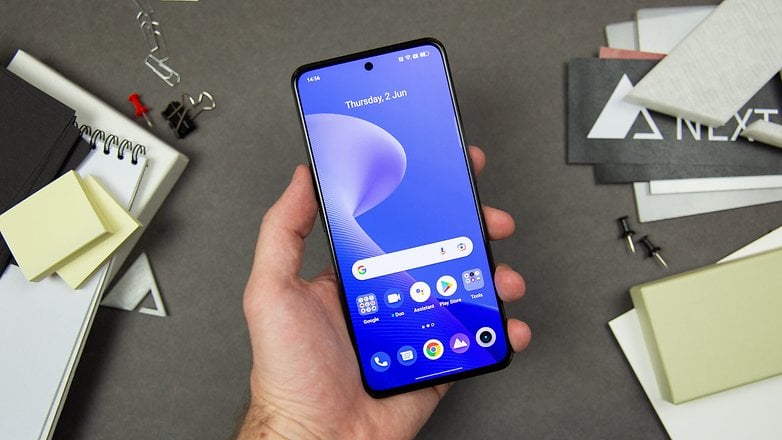
The Realme GT Neo 3 simply has a screen worthy of a modern flagship. The adaptive refresh rate of 120 Hz and the sampling rate that can be boosted up to 1,000 Hz are proof of this. Never mind the fact that the 1,000 Hz touch sampling rate can only be achieved when you are playing a game and go through the Touch Optimization feature via the Game Toolkit context menu.
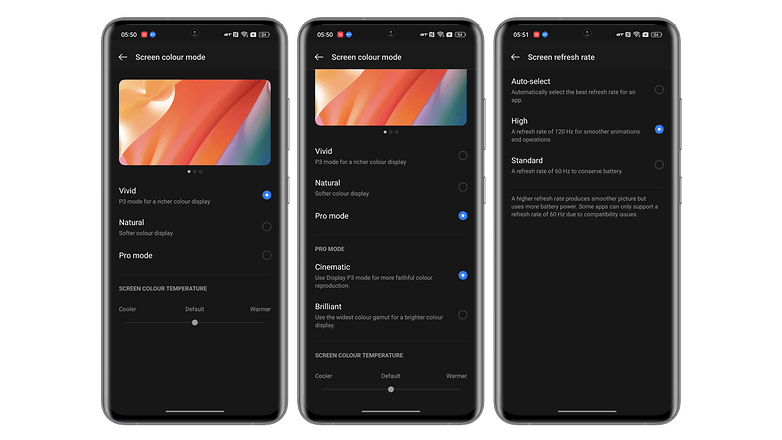
I really like the fact that there is no prominent chin or forehead bezels, which is usually the case in smartphones that fall within this price range. It’s more immersive for gaming or watching videos.
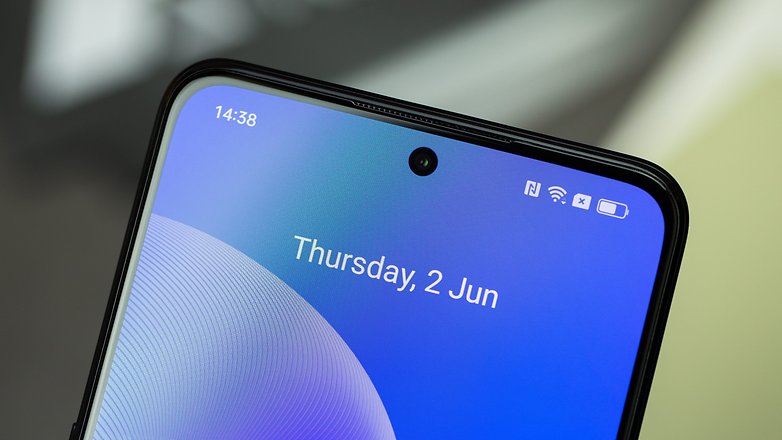
The 800 nits brightness in HBM mode is very good to look at. I just found the colorimetry a bit too cold with the default Bright mode. But Realme offers quite a few customization options that allow you to quickly recalibrate all this.
OS: Realme UI 3, a light Android 12 skin
The Realme GT Neo 3 runs on Realme UI 3, a skin that is based on Android 12. This means you will have access to all features found in
Android 12 like the Privacy Dashboard or dynamic themes. The Realme GT Neo 3 also benefits from a proper update policy.
What I liked:
- Android 12’s features
- Proper update policy
- Very practical Game Toolkit menu
- Complete battery utility
What I disliked:
- Presence of some bloatware
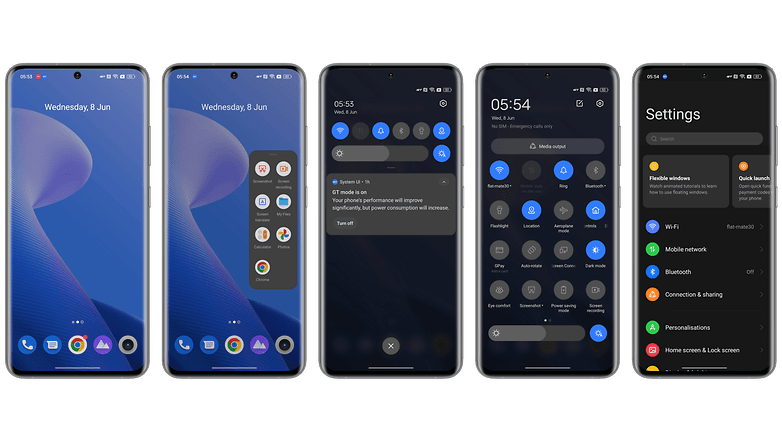
Realme UI 3 is a pretty light skin. I think it’s cool that Realme made the effort to implement the dynamic themes of Android 12 to match the colorimetry of the interface to the dominant colors of the wallpaper. I also think it’s cool to have the Android 12 Privacy Dashboard for managing permissions.
As for the rest, the features are quite classic. There are floating windows for multitasking purposes, the Smart Sidebar to access some shortcuts by swiping left from the edge of the screen, or the Quick Launch feature to quickly launch your favorite apps and functions each time you unlock.
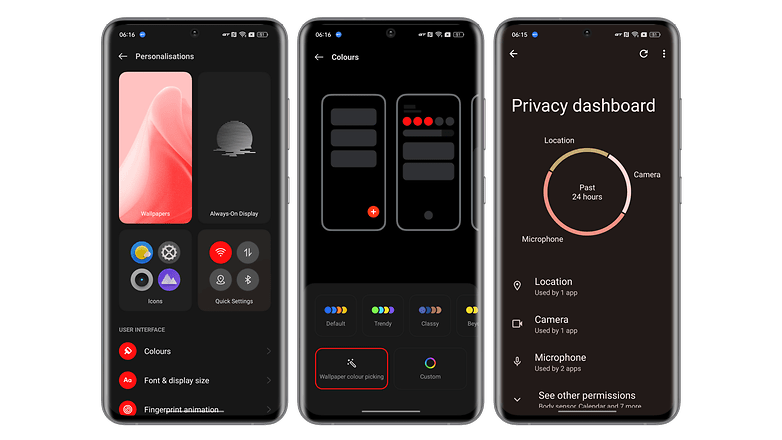
I noticed some bloatware like Amazon Shopping, TikTok, Booking, and Facebook right out of the box. I liked the battery utility which is quite complete. You have a precise history of the charge over the last 24 hours, which is not the case with all manufacturers. You can also activate and deactivate the fast charging feature (150 watts) as well as GT mode, which is supposed to boost performance even further.
A word to round off the Game Toolkit. This pop-up menu appears in the upper left corner of the screen when you play, making it very convenient. You can monitor the temperature of the smartphone, the frame rate, change the performance mode and the touch sensitivity (to activate the famous 1,000 Hz touch sampling rate).
Realme did not specify how many updates the Realme GT Neo 3 will receive. But if we were to stick to the manufacturer’s new policy, we can expect three major Android versions and four years of security updates. That’s perfectly all right!
Performance: A nice surprise
The Realme GT Neo 3 features a MediaTek Dimensity 8100 SoC that relies on the 5 nm manufacturing process, and is mated to a Mali-G610 GPU. The entire device comes with 8 to 12 GB of LPDDR5 RAM and 128 to 512 GB of UFS 3.1 storage, depending on the configuration of your choice.
What I liked:
- No overheating issues
- Stable framerate
What I disliked:
- Not the most powerful SoC in this price range
I will make no bones about it, the MediaTek Dimensity 8100 SoC is a mid-range mobile processor. This is one of the only points on the Realme GT Neo 3’s spec sheet that betrays its true price range.
Obviously, in terms of pure benchmark scores, the Realme GT Neo does not outperform models armed with the latest Snapdragon 888, 8 Gen 1 or 8+ Gen 1.
| Realm GT Neo 3 | Poco F4 GT | Xiaomi 12X | Redmagic 7 | Google Pixel 6 | |
|---|---|---|---|---|---|
| 3DMark Wild Life | 3509 |
9757 |
4283 | 10.146 | 5461 |
| 3DMark Wild Life Stress Test |
Best loop: 3514 Worst loop: 3406 |
Best loop: 9813 Worst loop: 4531 |
Best loop: 4278 Worst loop: 2906 |
Best loop: 10.143 Worst loop: 8395 |
Best loop: 5609 |
| Geekbench 5 | Single: 963 Multi: 4056 |
Single: 1235 Multi: 3618 |
Single: 966 Multi: 3340 |
Single: 1249 Multi: 3864 |
Single: 1031 |
But the Dimensity 8100 does not outperform in terms of power and it surprised me, even impressed me, with -its stability. On 3DMark’s Wild Life Stress Test benchmark, which simulates intensive gaming for 20 minutes, the Realme GT Neo never exceeded a temperature of 40°C. And the framerate showed a stability of 96.9% with a frame rate between 15 and 30 FPS.
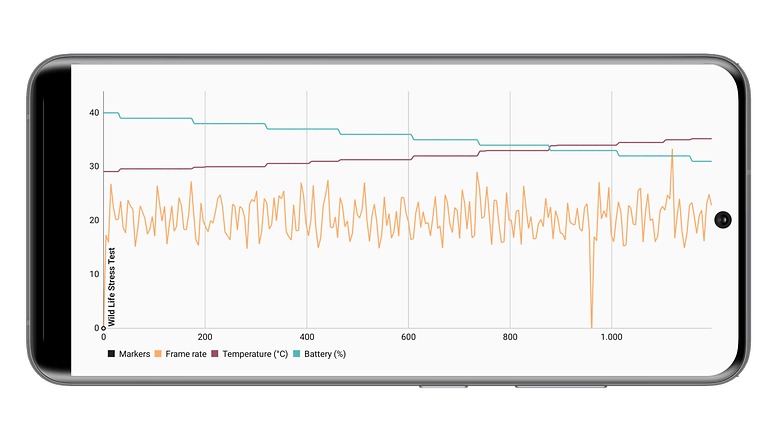
In reality, I had to limit my graphical ambitions a bit when I launched my game of the moment, Apex Legends Mobile. By default, the graphics are set to notch 2 out of 6 while the framerate is set to notch 3 out of 5. The game ran perfectly at 50 FPS, constantly.
I’ve included a gameplay clip below where you can see my settings. Note that the video capture was done in 1080p at 16 Mbps.
Camera: The Sony IMX 766 works great
The Realme GT Neo 3 is equipped with a triple camera module that is powered by a primary wide-angle Sony IMX766 lens at 50 MP as well as an ultra wide-angle lens of 8 MP, rounded up by a 2 MP macro lens. The selfie camera offers a resolution of 16 MP. When it comes to videos, the Realme GT Neo 3 is capable of recording up to 4K at 60 FPS with the rear camera module and 1080p at 30 FPS with the selfie camera.
What I liked:
- Effective 50 MP primary lens
- Portrait mode is clean
- Night shots work OK with wide angle
What I disliked:
- Ultra wide-angle lacks level of detail
- Digital zoom loses quality beyond the 2x magnification
- Selfies are too sharp
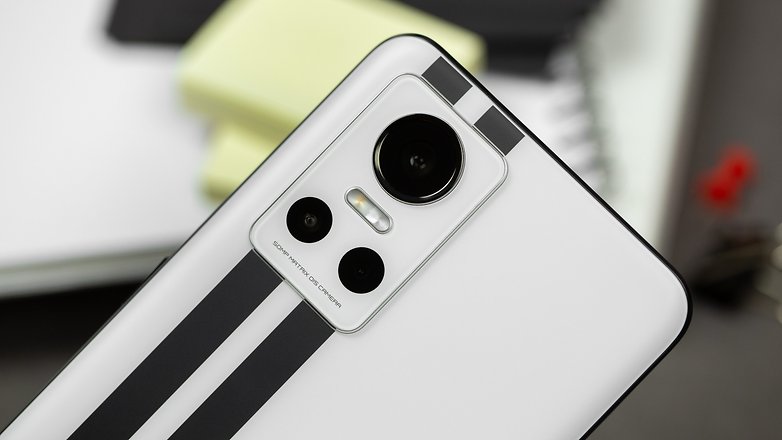
The primary lens and its Sony IMX766 sensor has already proven itself on several smartphones from the BBK Eletronics group. During the day, it performs very well with good color reproduction and good detail. The images are simply sharp to look at!
On the other hand, I find that the dynamic range to be rather restricted. Shadows sometimes take too much precedence over the rest of the image, which causes problems in terms of contrast.
The 8 MP ultra wide-angle cannot offer an optimal level of detail due to its resolution. At least the distortion at the edges of the image is limited and the colorimetry remains consistent with the wide-angle module.
Digital zoom also works fine as long as you don’t exceed the 2x magnification level. Portrait mode is clean with a precise clipping between fore- and background. The selfie camera is a bit over the top when it comes to sharpness.
At night, the smartphone also behaves very well with the primary lens. With the ultra wide-angle, forget about details because the smoothing is too noticeable. Dedicated night mode corrects shots rather effectively but sometimes has trouble mitigating the effects of flare from some strong light sources.
Battery life
The Realme GT Neo 3 with
Ultradart Charge 150W fast charging incorporates a 4,500 mAh battery while the 80W version comes with a 5,000 mAh battery.
What I liked:
- Solid battery life despite the 4,500 mAh rating
- The 150 watt ultra fast recharge
- The 150W charger is included in the box
- USB-C to USB-C cable
What I disliked:
The most expensive version of the Realme GT Neo 3, the one that accepts 150-watt wired fast charging, has a smaller battery capacity than the cheaper 80-watt version. Realme surely figures that Ultradart Charge makes up for this slight difference in charging capacity.
I ran the traditional PC Mark benchmark by setting the Realme GT Neo 3’s brightness to 200 nits and enabling the adaptive refresh rate. It took the smartphone 13:03 hours before it fell below the 20% remaining battery life mark. This is a very good score that I attribute to the efficiency of the SoC.
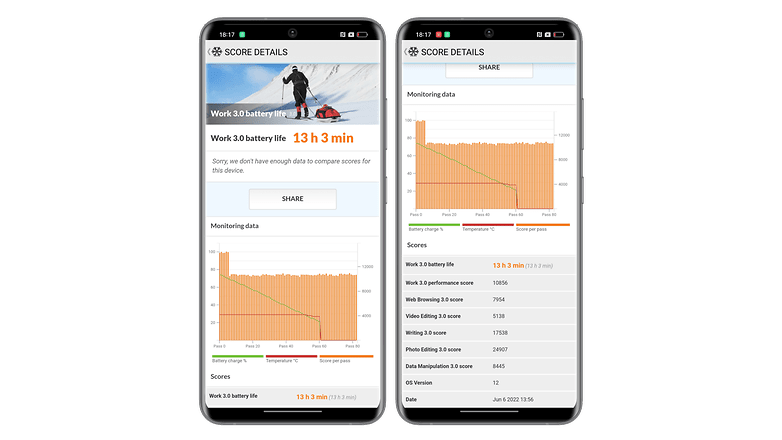
In real use, you can easily last a day and a half of normal use before needing to plug the charger. With heavy gaming and multimedia use, we can still last a good day without worrying.
The 150-watt charging is ultra efficient. For the most reluctant of you, note that you can disable the ultra fast charging mode. Realme UI 3 offers modes to preserve your battery and to adapt the recharge to your use (with the night recharge mode that is more progressive).
However, it changes one’s life to be able to recharge one’s smartphone from 0 to 100% in 15 minutes, tops. This is a tour de force by Realme, which is the first manufacturer to do so.
Technical specifications
| Realme GT Neo 3 – Technical specifications | |
|---|---|
| Product | |
| Image |  |
| Screen | 6.7 inch, Amoled | 1080 x 2412 pixels,120 Hz | brightness 800 nits (HBM) and 500 nits (typ) |
| SoC | MediaTek Dimensity 8100 (5 nm) | Mali-G610 GPU |
| Memory |
150W version: 12/256 GB | 80W version: 8/256 GB | UFS 3.1 | LPDDR5 | no microSD port |
| OS | Realme UI 3 based on Android 12 |
| Camera module (back) |
|
| Camera module (selfie) | 16 MP | f/2.5 aperture |
| Audio | 2 stereo speakers | No 3.5 mm jack | aptX HD codec |
| Battery |
|
| Connectivity | 5G | Wifi 6 | Bluetooth 5.3 | NFC | USB-C 2.0 |
| Dimensions & Weight | 163.3 x 75.6 x 8.2 mm | 188 g |
| Price | 150W version: €699.99 | 80W version: €599.99 |
Conclusion
The Realme GT Neo 3 occupies an odd position in the market. It is less powerful than its competitors at a similar price tier the Poco F4 GT or the Xiaomi 12X that I recently reviewed.
However, the MediaTek Dimensity 8100 SoC is more power efficient and also allows it to offer more stable performance and better temperature control. Personally, I don’t find it a big loss in terms of performance and I found the gaming experience very cool (literally) with this smartphone.
The screen is top notch, the design is stylish, the battery life is solid, the camera module is balanced and rather versatile, not to mention an update policy that works. Basically, the Realme GT Neo is an intermediate to high-end smartphone, very balanced, but it places the emphasis on one particular feature.
And the main selling point of the Realme GT Neo 3, namely the Ultradart Charge 150W clearly allows it to make a difference. Basically, if fast charging is a key criteria for you, I heartily recommend the Realme GT Neo 3 with 150W in tow. On the other hand, if you are more inclined towards the 80W version, which is lighter on the wallet, I would suggest you to opt for the Realme GT 2, which is very similar but armed with a more powerful SoC.






